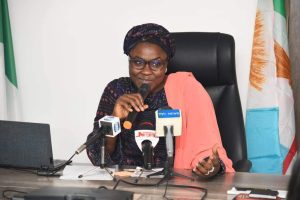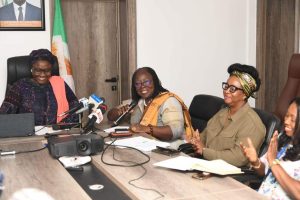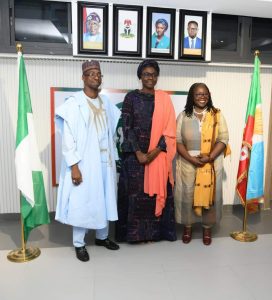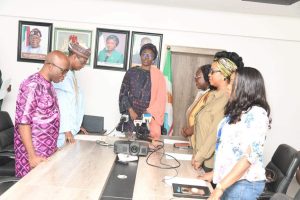
The Federal Government has called for the support of the United Nations Development Programme (UNDP) to implement the strategic plans of the Ministry of Youth Development which are aimed at providing young Nigerians with the necessary skills, mentorship, conducive environment and access to resources that will empower them to become active contributors to the country’s economy.
Dr. Jamila Bio Ibrahim, the Minister of Youth Development, made this call during a meeting with the Resident Representative of the UNDP, Ms. Elsie Attafuah, which took place at the minister’s conference room in Abuja.
The Head of Press and Public Relations Unit in the ministry, Maryam Umar Yusuf, said that while shedding light on the strategic areas of the ministry’s agenda, Bio-Ibrahim said, “Our strategic ambition is to transform and reposition the Nigerian youth as catalysts for economic development.
“Young people must be an integral part of this process. We have other sub-ambitions, the first being a reduction in the youth unemployment rate, followed by an increase in youth possessing skills that are in line with global demand, and an increase in youth participation in social and economic development.”
She further said, “Our core tactical initiatives are focused on four pillars: Governance, Jobs and Skills Innovation, Culture and Behavioural Change, and Human Capital Development. These pillars aim to guide policy advocacy and development, improve coordination across stakeholders, and provide multi-agency youth programmes and resources.”

She emphasised the determination of her ministry to establish communication governance frameworks, implement youth-embedded public and private sector mentorship programs, create multi-sector job off-taker platforms for youth employment, enhance NYSC reforms and establish youth villages and innovation centres.
The minister also disclosed plans to revitalise the national youth investment fund, launch the Young Leaders Institute, implement social, behavioural, and cultural change programmes aimed at tackling youth-related issues such as climate change, gender, mental health, drug, and substance abuse.
The minister further explained that the initiative includes provision of access to business literacy, financial management, and entrepreneurship training to meet the global market demand.
As part of efforts to actualise these initiatives, she disclosed plans to create more professional departments in the ministry.
She said: “We are currently seeking approval to create additional professional departments.
“However, the one that is particularly important to us is the Youth Well-being Department. It is crucial to create such a department because when young people have good mental health, they are more likely to be productive. Therefore, our goal is to prioritize the well-being of our youth.”
She further said, “We are seeking approval to restart the Nigeria Investment Fund. If approved, it will enable us to employ the cluster approach with a view to enhancing youth development and empowerment. This, in turn, will lead to tangible sustainable impact on a great scale, and benefit our economy.”
Bio-Ibrahim maintained that one of the ministry’s main goals is to increase the representation of young people in politics and governance at all levels by seeking the Council’s approval for 30 percent youth quota.
In his welcome remark, Dr. Donuma Umar Ahmed, Permanent Secretary of the ministry, expressed his sincere appreciation for the meeting with UNDP Resident Representative.
He posited that the meeting was aimed at bringing about positive change in the lives of young people in Nigeria. He urged the participants to be proactive in their contribution.

The Resident Representative of the UNDP, Ms. Elsie Attafuah, gave the assurance that her organisation would provide support for the initiatives.
She lamented that the African continent is facing a daunting challenge as young people continue to struggle to find jobs, leading to frustration and the growing trend of going abroad to seek jobs.
She pointed out that it was high time to delve deeper into the root causes of the problem and take a more realistic approach towards youth empowerment and job creation.
Attafuah said: “We must create more opportunities and find jobs for our people, as merely providing them with starter packs or training won’t solve it. We need to identify the obstacles that hold us back and tackle them head-on.
“Let’s work together to eradicate this problem and create a brighter future for our youth and our continent.
“In the four pillars, we will encourage everyone to think outside the box and explore innovative practices that align with the ever-changing world.”
She expressed her eagerness to collaborate with the ministry in the priority areas outlined by the minister.
She stressed the importance of ensuring that the design, implementation, and operationalisation are done properly.

